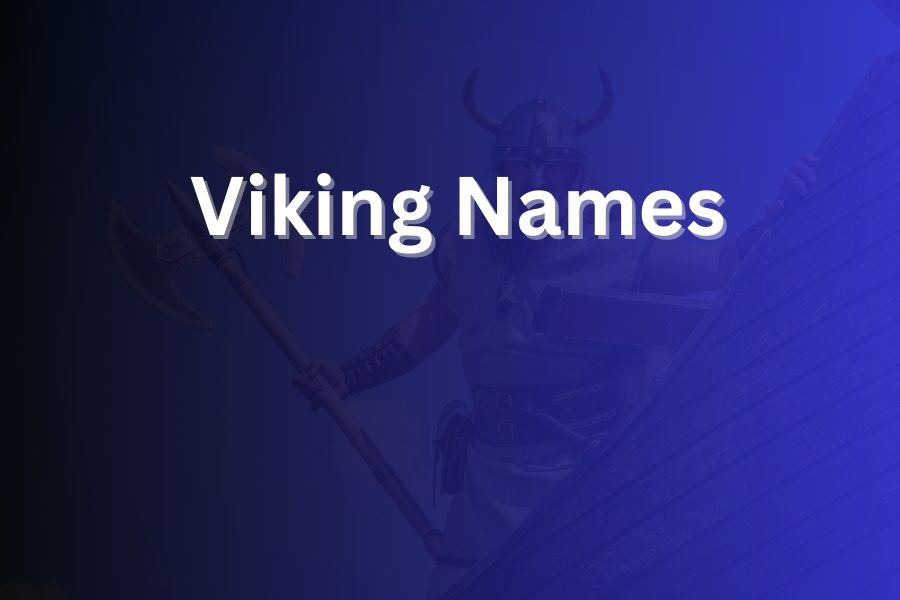In this article you will learn the origin, structure, meaning and modern use of Viking names.
You will also discover how to pick authentic Old Norse-style names, see popular examples for men and women, and get answers to common questions about these powerful names.
What Makes a Name “Viking”?
The Viking Age name pool comes from Old Norse and Germanic roots. Many names referred to gods, animals or battle. For example, some boys carried names meaning “wolf” or “bear” to show strength. Others borrowed from gods such as Thor. The names served both identity and status.
In modern times you see these names used globally, often for their strong sounds and historic appeal. Scandinavia remains a source for inspiration.
Origin and Meaning of Old Norse Names
Viking names developed in Scandinavia between roughly 800 to 1100 CE. They were formed from compound words: one part a meaningful noun or element (like bear, god, spear) and one part a descriptor (ruler, warrior). For instance “Erik” comes from Eirikr, meaning “ever ruler” or “eternal king”.
Animal symbolism showed up frequently: names like “Ulf” meant wolf, “Björn” meant bear. These reflected ideals of power and ferocity. One museum of Danish history notes that animal names celebrated the gods’ great adversaries such as the wolf Fenrir.
Names also borrowed from mythology and divine concepts: gods (Thor, Freyja), fate, and natural forces all played a role. Using these elements gave a name weight, identity and meaning.
How to Choose an Authentic Viking Name
When you want a name with genuine Viking-era flavour, consider these steps:
- Pick a strong root word: war, spear, thunder, wolf.
- Add a descriptor: warrior, ruler, protector.
- Decide gender and style preference (many names are uniquely masculine or feminine).
- Check modern pronunciation and storage: can it be easily used today?
- Make sure it carries meaning you like.
You also see suffixes and naming conventions. For example, in Old Norse you might find “-son” (son of) or “-dóttir” (daughter of). While modern usage may drop those, the sense of lineage remains.
Popular Viking Names for Men
Here are some male names that carry Viking authenticity:
- Erik – Meaning “eternal ruler” or “always ruler.”
- Leif – Means “descendant” or “heir.”
- Ragnar – Means “warrior” or “judgment.”
- Olaf – Means “ancestor’s relic” or “heirloom.”
- Gunnar – Means “warrior” or “brave fighter.”
- Björn – Means “bear,” highlighting strength.
- Ivar – Means “bow warrior” or “archer warrior.”
Each of these names offers a direct link to Norse heritage and can work well in a modern U.S. context without feeling overly archaic.
Inspirational Viking Names for Women
Female names also reflect bravery, divine lineage and nature. Here are some examples:
- Freya – Named after the goddess of love and fertility.
- Sigrid – Means “beautiful victory.”
- Ingrid – Means “fair, beautiful, beloved.”
- Thora – Means “thunder,” giving a powerful feel.
- Helga – Means “holy” or “blessed.”
- Gunnhild – Means “warrior maiden,” symbolizing valor.
- Solveig – Means “sun strength,” symbolizing warmth and resilience.
These names provide a blend of mythic resonance and current usability.
Modern Popularity and Adaptations
While true Old Norse forms remain niche in the U.S., many of these names chart well in popularity. For example, “Erik” peaked in past decades but remains widely recognized. Using a strong Viking name today gives you something memorable and meaningful.
Adoption often comes with slight modifications in spelling, pronunciation or usage. Some parents use shortened forms or blend the historic root with a modern spelling. The trend toward names with authentic and meaningful roots is rising in the U.S. research shows interest in heritage names continues to grow.
Use Cases: Where Viking Names Shine
You might choose a Viking name for many reasons:
- Baby naming: Distinctive, meaningful, yet usable.
- Fiction or storytelling: Bring a character to life with genuine roots.
- Gaming or online persona: Create a memorable handle with gravitas.
- Branding: A product or business may adopt the vibe of strength or heritage.
When you apply the name to these use cases, ensure the meaning aligns with image, sound and target audience.
Tips for Using a Viking Name Effectively
- Pronunciation matters: Choose one that works in everyday American English.
- Stay aware of cultural context: While borrowing heritage is fine, avoid misappropriation or misinformation.
- Pair first and middle names wisely: A strong Viking first name may balance with a simpler middle name.
- Consider nicknames and variants: Some names shorten awkwardly or may lead to unintended nicknames.
- Check meanings: Many Viking names carry meaning you’ll want to embrace, not ignore.
Common Misconceptions
One myth is that all Vikings wore horned helmets. That is false. The same holds for names: not every “Viking name” is authentic Old Norse. Some are modern fabrications or generators. Real names reflected language, culture and the period. Respecting that gives your choice validity.
Another misunderstanding is assuming the name guarantees a “wild” or “barbaric” vibe. In fact, many Viking names meant wisdom, protection or community, not just battle.
Why Are Viking Names So Popular Now?
Several factors fuel the trend:
- Streaming shows, historical dramas and games inspired by Viking culture create fascination.
- Parents look for unique names with meaning rather than purely trendy picks.
- Global mobility and multicultural identity make heritage names appealing.
- The sound aesthetic: short, strong, rhythmic names suit today’s naming trends.
One recent survey of naming trends found greater interest in names with mythological or historic roots over the past five years. Choosing a Viking name taps into that shift.
How to Adapt a Viking Name for Today
You may want to adapt a Viking name for modern usage. Here’s how:
- Simplify spelling: Use “Bjorn” instead of “Björn” to help pronunciation.
- Use it as a middle name: Gives flexibility if one prefers a more traditional first name.
- Choose variant forms: Example “Sigrid” becomes “Sigri” or “Inga” as softer forms.
- Combine with American cultural style: Pair the strong Viking first name with a typical U.S. surname or middle name.
- Check the initials and length: Many U.S. parents keep names within two-syllables + middle name for flow.
Seven Frequently Asked Questions (FAQs)
- What does the name “Erik” actually mean?
Erik comes from Old Norse Eirikr, meaning “ever ruler” or “eternal king.” It blends the elements ei (always) and rikr (ruler). - Are Viking names only for boys?
No. There are many authentic female Viking names with rich meanings. Examples include Freya, Sigrid, Ingrid and Helga. - Can I use a Viking name if I have no Scandinavian heritage?
Yes. Names often carry universal appeal and meaning. Just ensure you understand and respect their cultural roots. - Will a Viking name work in modern America?
Absolutely. Many Viking names are already in use and adapted for U.S. pronunciation. Choose a name you like and that fits your lifestyle. - Are all generators of “Viking names” accurate?
Not always. Some name generators produce invented or loosely derived names. For authenticity, look for roots in Old Norse or Germanic elements. - Does the meaning of a Viking name matter?
Yes. Names were crafted with intention, meaning and context. If meaning matters to you, take time to research proper translation and cultural significance. - How many syllables should I choose for a Viking name?
There is no rule, but many historic names were one to three syllables. Shorter names tend to flow better in an American context and avoid pronunciation issues.
Conclusion
Choosing a Viking name gives you a blend of strength, heritage and modern appeal. Whether you select one for your child, a character, a brand or yourself, understanding origin, meaning and usage ensures you make a confident choice.
Use the roots of Old Norse words, respect the culture, and select a name that fits your voice and today’s world. With more people looking for names that carry story-rich backgrounds, Viking names offer a strong option for your naming journey.










